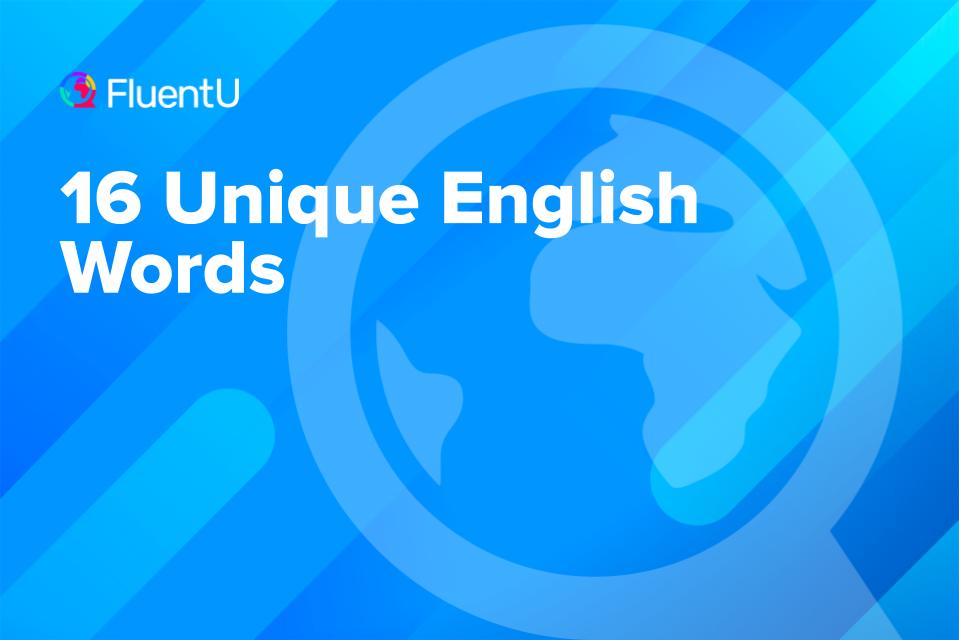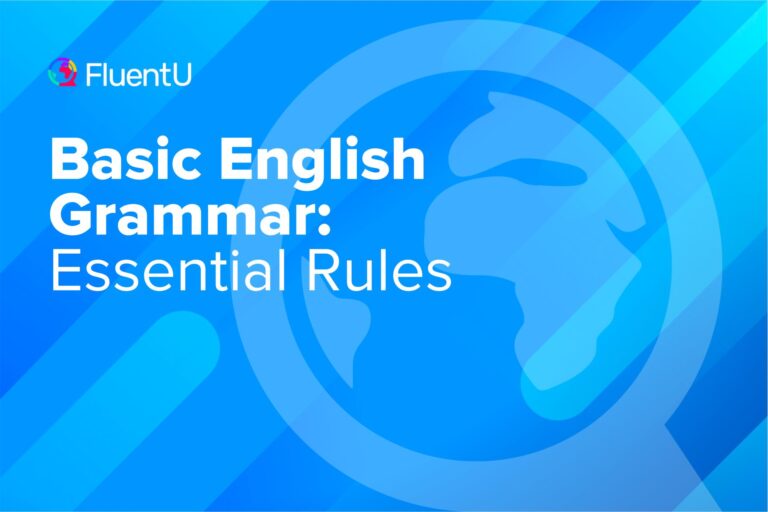16 Unique English Words

Have you ever heard someone say an English word you didn’t understand? A lot of English words come from other cultures and languages, so English has a ton of interesting words that you may not be familiar with yet.
The words in this post are considered unique because they have unusual spelling, pronunciation and meanings. For each word, there is a pronunciation guide from Merriam-Webster, as well as our own audio, plus a definition and an example sentence.
Contents
Download: This blog post is available as a convenient and portable PDF that you can take anywhere. Click here to get a copy. (Download)
1. Flummox
Pronunciation: ˈflə-məks
When you read this word, does it jump out and make you a little confused?
If so, you were right to be confused and puzzled! That’s exactly what flummox (verb) means.
Whenever you see an unusual English word, you’re likely to be flummoxed for a bit until you check your dictionary and find out that its meaning is really quite simple.
2. Dowdy
Pronunciation: ˈdau̇-dē
This word looks simple but it’s unique in that it’s a pretty old word that’s not used often these days.
Dowdy (adjective) is used to describe something that’s old and shabby, not modern or stylish.
Maybe she’s having a bad day. I’ve never seen her wearing anything so dowdy before.
3. Howdy
Pronunciation: ˈhau̇-dē
This word rhymes with the previous word but means something completely different.
Howdy is a casual greeting that is not commonly used, but can add some flavor to your English.
4. Nincompoop
Pronunciation: ˈnin-kəm-ˌpüp
Here’s a word that not only looks funny but sounds funny too. Try saying it out loud!
What’s even funnier is that nincompoop (noun) means a silly person and is sometimes used jokingly to refer to someone who is not very smart.
My house is just down the road from the bus stop. I don’t understand how those nincompoops managed to lose their way.
5. Muesli
Pronunciation: ˈmyüs-lē
Notice the unusual spelling and pronunciation of this word, which was first used in 1939.
Muesli (noun) is a cereal consisting of rolled oats, fruits and nuts. It’s a popular breakfast food in Switzerland.
Eating a bowl of muesli in the morning is a healthy way to start your day.
6. Phlegm
Pronunciation: ˈflem
This word is unusual in that its spelling doesn’t reflect how it’s pronounced.
Phlegm (noun) is the viscous (thick) fluid that blocks your nose and throat when you have the flu.
Phlegm and a runny nose can really make you feel uncomfortable, so it’s best to take the day off and stay home till you feel better.
7. Baloney
Pronunciation: bə-ˈlō-nē
According to Merriam-Webster, this word was first used almost 100 years ago! Do you know what it means? Hint: It has nothing to do with balloons.
Baloney (noun) simply means nonsense and is often used when you disagree with someone.
That’s baloney! Don’t believe a word that he says!
8. Myopic
Pronunciation: mī-ˈō-pik
You may find this word unique because of its unusual spelling.
Myopic (adjective) is the scientific word for nearsightedness, an eye condition in which you’re unable to see objects or images that are far away from you.
I’m myopic. I really need my eyeglasses. I can’t see without them.
9. Bamboozle
Pronunciation: bam-ˈbü-zəl
This word was first used around 300 years ago. That’s really old! Any idea what it means? Hint: It’s not related to bamboo.
To bamboozle (verb) someone means to trick or confuse them.
I went to buy a TV that was on sale but ended up being bamboozled into buying a more expensive unit.
10. Phyllo
Pronunciation: ˈfē-(ˌ)lō
Now, this is a pretty unique word not only because of the way it’s spelled but also because of how it’s pronounced.
Phyllo (noun) is a very thin dough that pastry chefs layer together to form a flaky pastry.
The orange-pecan baklava pie I had yesterday was made with phyllo pastry. Yummy!
11. Thwart
Pronunciation: ˈthwȯrt
This word dates back to the 13th century. Indeed, its spelling is similar to how some old English words are spelled, and it’s unique because it’s still used quite often today.
To thwart (verb) means to ruin (spoil) someone’s efforts or to prevent a plan from becoming successful.
We spent months preparing to climb Mount Everest. Who knew the weather would thwart our plans at the last minute?
12. Brouhaha
Pronunciation: ˈbrü-ˌhä-ˌhä
Here’s an old-fashioned, informal word with a funny pronunciation that was taken directly from French. Are you laughing now? I bet you are. Ha-ha!
Brouhaha (noun) simply means an uproar (upset) or a lot of anger and complaining.
What’s with all that brouhaha? I think he did the right thing by resigning from his position.
13. Zeal
Pronunciation: ˈzēl
Words that begin with the letter “z” are always interesting. This one is also unique because it comes from Latin and Greek and was first used in the 14th century.
Zeal (noun) refers to a strong interest or eagerness in pursuing something.
Her zeal for handmade designer shoes and handbags has made her the talk of the town.
14. Pneumatic
Pronunciation: nu̇-ˈma-tik
Does this word look unusual to you? I find the spelling very interesting. It’s not common for the letter “p” to be followed by “n.”
Pneumatic (adjective) is used to describe something that’s filled with air or gas or that uses air pressure.
Can you think of an example of something that’s pneumatic? That’s right. Car tires, bicycle pumps and vacuum cleaners are all pneumatic.
15. Noxious
Pronunciation: ˈnäk-shəs
Words with the letter “x” are also quite interesting. Note the pronunciation of this word, as it’s not usually how you would pronounce the letter “x.”
Noxious (adjective) often refers to something that’s dangerous, harmful or destructive to living things.
You shouldn’t be standing behind that bus and breathing in all those noxious fumes. It’s bad for your health.
16. Flimflam
Pronunciation: ˈflim-ˌflam
Now here’s a cute and funny word that’s been around since the 16th century, according to Merriam-Webster. Can you guess its meaning?
Flimflam (noun) refers to a trick or a ploy to deceive someone.
If you’re going to buy a used car online, you must be able to separate the flimflam from the facts.
Why Learn Unique Words in English?
Because unique and unusual words are so interesting, they can be both good fun and challenging to learn.
When you look at a unique English word, you may be puzzled about how to pronounce it, or you may wonder why it’s spelled the way it is.
Apart from satisfying curiosity and challenging yourself, it’s easy to see why knowing unique words can be useful if you’re someone who loves playing word games. Many of these words may not be used very often, which may put you at an advantage to win!
Finally, because unusual English words are used less often, using them will make you sound smart.
Remember, the more you practice with these unique English words the more fluent you’ll sound, and you’ll surely impress a lot of people! Learning unique words is one path to becoming an advanced English learner.
So there you have it—a list of unique English words you can add to your vocabulary!
To learn more unusual words by hearing them in context, watch an English-language movie or try a virtual immersion program like FluentU.
FluentU takes authentic videos—like music videos, movie trailers, news and inspiring talks—and turns them into personalized language learning lessons.
You can try FluentU for free for 2 weeks. Check out the website or download the iOS app or Android app.
P.S. Click here to take advantage of our current sale! (Expires at the end of this month.)

So, go out there, have fun and impress everyone!
Download: This blog post is available as a convenient and portable PDF that you can take anywhere. Click here to get a copy. (Download)
And One More Thing...
If you like learning English through movies and online media, you should also check out FluentU. FluentU lets you learn English from popular talk shows, catchy music videos and funny commercials, as you can see here:
The FluentU app and website makes it really easy to watch English videos. There are captions that are interactive. That means you can tap on any word to see an image, definition, and useful examples.
For example, when you tap on the word "searching," you see this:
Learn all the vocabulary in any video with quizzes. Swipe left or right to see more examples for the word you’re learning.

FluentU helps you learn fast with useful questions and multiple examples. Learn more.
The best part? FluentU remembers the vocabulary that you’re learning. It gives you extra practice with difficult words—and reminds you when it’s time to review what you’ve learned. You have a truly personalized experience.
Start using the FluentU website on your computer or tablet or, better yet, download the FluentU app from the iTunes or Google Play store. Click here to take advantage of our current sale! (Expires at the end of this month.)










